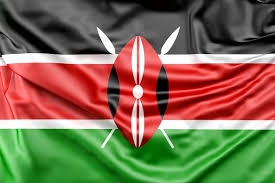Kenya: A Nation on Edge - Protests and Profound Disillusionment in June 2025. By Jo Ikeji-Uju


Kenya has once again been gripped by widespread unrest in June 2025, with protests erupting across the nation to commemorate the deadly events of June 2024. These demonstrations are a stark manifestation of a deep and growing disillusionment with the government of President William Ruto, as many Kenyans feel their voices have been systematically ignored and promises of reform remain unfulfilled.
Echoes of 2024: A Year of Unmet Expectations-
The June 2025 protests served as a powerful and somber anniversary of the 2024 "Gen Z uprising" which saw thousands, predominantly youth, take to the streets against the controversial Finance Bill 2024. While the government eventually withdrew that bill, the underlying issues that fueled the protests—economic hardship, rampant corruption, and police brutality—have not been adequately addressed.
The 2024 protests culminated in the unprecedented storming of Parliament on June 25, 2024, an event that shocked the nation and drew international condemnation. During those demonstrations, security forces used lethal force, resulting in at least 60 deaths and hundreds of injuries. The current protests highlight a pervasive sentiment among Kenyans that little has genuinely changed since then. A GeoPoll survey conducted in the wake of the June 2025 protests revealed that 57% of respondents believed nothing had truly improved since June 2024, reflecting a widespread perception of stagnation in governance and accountability.
Catalysts for June 2025 Unrest-
Several factors converged to reignite the flames of dissent in June 2025:
-
Continued Police Brutality and Impunity: A major flashpoint for the renewed anger was the death of Albert Ojwang, a blogger and teacher, in police custody in early June 2025. Ojwang was arrested after allegedly defaming a senior police officer and was found dead in a Nairobi police cell. This incident, coupled with an increase in reported police killings and forced disappearances (with Missing Voices Kenya documenting a 450% increase in 2024), intensified public outrage and brought police accountability to the forefront of protesters' demands.
-
Persistent Economic Hardship: While the initial 2024 protests were primarily driven by the proposed tax increases in the Finance Bill, economic concerns remain deeply ingrained. High taxes, mass youth unemployment (with one million youth entering the job market annually), inflation, and a skyrocketing cost of living continue to make life unbearable for the majority of Kenyans. The perception that the government's economic policies disproportionately benefit a small elite while the general population struggles fuels a profound sense of injustice.
-
Unfulfilled Promises of Reform and Dialogue: Following the 2024 protests, President Ruto had made assurances of reforms and open dialogue. However, these promises have largely not materialized. Many Kenyans feel that the government has resorted to superficial initiatives and propaganda rather than implementing genuine structural changes. There's a strong belief that the government is not listening to its citizens, with 71% of GeoPoll respondents indicating their voice is not being heard.
-
Deep-Seated Corruption and Lack of Accountability: Corruption remains a persistent grievance. Protesters point to the lavish lifestyles of politicians contrasted with the struggles of ordinary citizens, and the lack of accountability for alleged misuse of public funds. The perceived impunity of the ruling class further erodes public trust.
-
Government's Authoritarian Leanings: The Ruto administration's response to dissent has been characterized by heavy-handedness and a perceived disregard for democratic norms. This includes attempts to suppress media coverage of the protests, deploying security forces with excessive force, and branding legitimate civic expressions as "treasonous" or "attempted coups."
Nature and Demands of the Protests-
The June 2025 protests, largely organized through social media by youth activists (often referred to as "Gen Z"), were widespread, occurring in at least 27 of Kenya's 47 counties. While initially overwhelmingly peaceful, many turned violent as the day wore on, with police employing tear gas, rubber bullets, and live ammunition. Reports indicated 16 deaths and over 400 injuries as of June 26, 2025, primarily from police fire. There were also reports of "hired goons" infiltrating protests to provoke chaos and justify crackdowns.
The demands of the protesters extend beyond specific economic grievances and reflect a call for fundamental systemic change. Key demands include:
-
Leadership Change: A significant proportion (42%) of respondents in the GeoPoll survey cited leadership change as the top demand for ending the protests. This indicates a loss of confidence in the current administration.
-
Accountability for Police Brutality: Justice for victims of police killings, including Albert Ojwang, and holding abusive officers accountable is a prominent demand.
-
Youth Empowerment and Employment: Addressing the high rates of youth unemployment and creating genuine opportunities for young Kenyans.
-
Tackling Corruption: A concerted effort to combat corruption and ensure transparency and accountability in governance.
-
Economic Reform: Policies that genuinely address the cost of living crisis and alleviate financial burdens on ordinary citizens.
-
Greater Public Inclusion in Decision-Making: A desire for the government to genuinely engage with citizens' concerns and incorporate their voices in policy formulation.
Government Response and Its Implications-
The government's response to the June 2025 protests has largely mirrored its approach to the 2024 demonstrations:
-
Heavy-handed Suppression: Police deployed extensively, using tear gas, rubber bullets, and live ammunition to disperse demonstrators. Barricades and razor wire were erected around key government buildings.
-
Media Censorship: The Communications Authority of Kenya (CA) issued a directive to media houses to halt live broadcasts of the protests, a move widely condemned by human rights groups and the Law Society of Kenya as unconstitutional. Although a high court judge swiftly overturned this directive, it highlighted the government's attempts to control the narrative. Social media platforms like Telegram were also reportedly restricted.
-
Delegitimization of Protests: Government officials, including the Deputy President, initially branded the demonstrations as an "attempted coup" and orchestrated by criminal elements, seeking to delegitimize the genuine grievances of the protesters.
-
Limited Meaningful Reforms: Despite promises, there has been a perceived lack of structural reforms. Instead, the government has been accused of pursuing superficial "empowerment initiatives" and disbursing funds of questionable origin, rather than addressing core issues.
This continued heavy-handedness and failure to address the root causes of the protests risk alienating an entire generation of young Kenyans and further exacerbating the crisis of governance. International organizations like Human Rights Watch and the International Crisis Group have urged the Kenyan government to embrace international norms, hold authorities accountable for abuses, and engage meaningfully with youth discontent rather than resorting to repression.
Conclusion-
The June 2025 protests in Kenya serve as a critical indicator of profound disillusionment with the current government. The ongoing unrest is not merely a commemoration of past grievances but a powerful reaffirmation that the fundamental issues of economic hardship, corruption, police brutality, and a perceived lack of government accountability remain unaddressed. The government's continued reliance on repressive tactics rather than genuine reform and dialogue risks deepening the chasm between the state and its citizens, particularly the youth who are increasingly at the forefront of demanding a more just and equitable Kenya. The stability of the nation hinges on the government's willingness to acknowledge and genuinely respond to these deep-seated grievances.
- Questions and Answers
- Opinion
- Motivational and Inspiring Story
- Technology
- Live and Let live
- Focus
- Geopolitics
- Military-Arms/Equipment
- Security
- Economy
- Beasts of Nations
- Machine Tools-The “Mother Industry”
- Art
- Causes
- Crafts
- Dance
- Drinks
- Film/Movie
- Fitness
- Food
- Games
- Gardening
- Health
- Home
- Literature
- Music
- Networking
- Other
- Party
- Religion
- Shopping
- Sports
- Theater
- Health and Wellness
- News
- Culture

